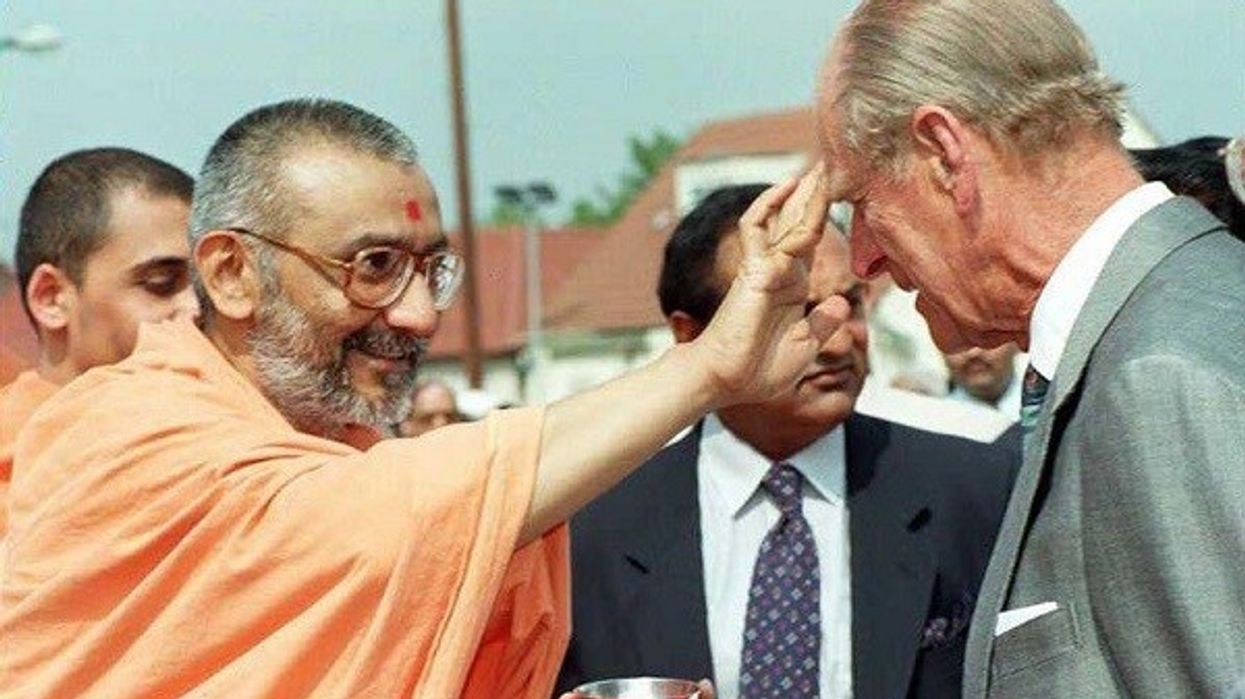SWAMIS at the BAPS Shri Swaminarayan Mandir, London, popularly known as the Neasden Temple, as well as devotees across the UK were deeply saddened to learn of the passing of Prince Philip, the Duke of Edinburgh.
We fondly recollect the Duke of Edinburgh’s visit to the Mandir on July 23, 1996. He was impressed with the devotion, the architecture and the volunteers who had contributed to the making of the mandir, as well as His Holiness Param Pujya Pramukh Swami Maharaj, its founder and creator.
A year later, on October 15, 1997, during a visit to India, the Duke of Edinburgh visited the Swaminarayan Akshardham temple in Gandhinagar, Gujarat, and expressed a wish to meet HH Pujya Pramukh Swami Maharaj.
When HH Pujya Pramukh Swami Maharaj visited the UK later that year, he accepted an invitation from the Duke of Edinburgh to visit Buckingham Palace. A meeting between them duly took place on November 10, 1997.
This special bond illustrates Prince Philip’s profound impact on interfaith dialogue, described by the Archbishop of Canterbury, the Most Reverend Justin Welby, as well as chief rabbi Ephraim Mirvis in their respective tributes following the Prince’s passing.
In 1986, Prince Philip, then international president of the WWF [World Wide Fund], invited leaders of five of the major religions of the world – Buddhism, Christianity, Hinduism, Islam and Judaism – to discuss how their faiths could help save the natural world. This historic meeting formulated key statements by the five faiths outlining their distinctive traditions and approach to the care of nature.
The Rt Revd Jonathan Clark and Narendra Waghela, co-chairs of the Inter Faith Network for the UK, also underlined Prince Philip’s profound impact on interfaith harmony: “Among Prince Philip’s many achievements through the years have been the consistent encouragement of inter-faith dialogue. We express our great gratitude for the significant contribution of Prince Philip to the development of interfaith understanding and cooperation for the common good, one that is of ever-greater importance in our increasingly diverse society and interconnected world.”
The head swami at Neasden Temple, Yogvivekdas Swami, said, “On behalf of His Holiness Mahant Swami Maharaj and everyone here at BAPS Swaminarayan Sanstha in the United Kingdom, we offer our deepest condolences and prayers to the royal family of the United Kingdom. We shared and deeply valued his commitment to interfaith harmony and care for the environment, and our special friendship will serve to further his noble work.
“His invaluable contribution in bringing religions together will leave a lasting legacy across the world. Our heartfelt prayers are with the royal family at this time.”




